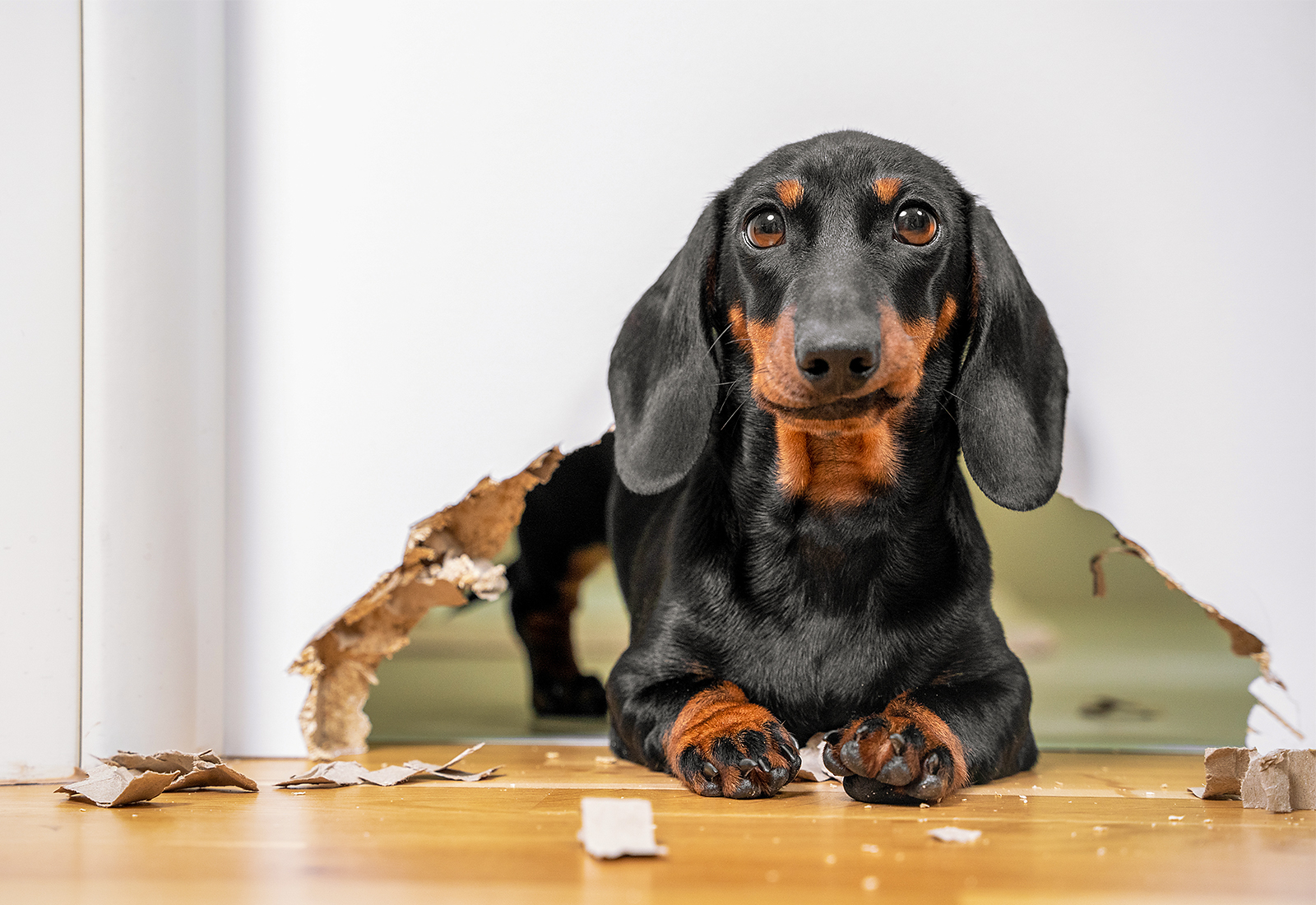Puppies have become a pandemic staple. Yet with the vaccination rollout, our dogs do not know what is coming. The hours they have been spending at home with their owners are going to be spent all alone after people go back to the office, school and other routines. Lindsay Nakonechny ’13 BSc(Animal Health), knows how to recognize anxiety in dogs. She is the Animal Welfare Advisor for the Edmonton Humane Society and she’s here to help you prepare your dog for a more independent life. These tips can help your dog have a more positive experience while home alone.
1: Recognize the signs of anxiety and stress
As you prepare to go back to work or school, learning to recognize the signs of stress or anxiety in your dog is vital. When you are getting ready to leave your house, notice how your dog is behaving. Signs of stress or pre-departure anxiety in your dog can look like out-of-context yawning, lip licking, pacing around the house, whining or panting. Your dog may even sit by the door or hide somewhere when you are getting ready to leave. Once you leave, your dog may even have destructive behaviour, like scratching or biting the doorway, chewing things they shouldn’t or trying to escape the house while you're gone. It’s important to remember that our dogs aren’t intending to behave badly or be a nuisance. “They’re trying to cope with stress and change in routine they’re not used to,” says Nakonechny.
2: Practise perfect exits
Your dog needs to practice being home alone before you go back to work. Nakonechny suggests mock departures, leaving your house for short periods of time at first and then longer periods of time. The idea is to get your dogs used to seeing you prepare to leave and then actually leave without them. You can also encourage your dog to spend less time with you while you’re home. So, while it’s nice to have office dogs as little foot warmers, encouraging your pups to spend time away from the home office and in other areas of the house without you will be beneficial. “Try giving them enrichment toys or scent items — put them in a different room than they’re used to being in,” Nakonechny says. Enrichment toys provide dogs with entertainment and mental stimulation. Establishing a routine by practising mock departures, giving them enrichment toys and sufficient exercise will better prepare your companion for post-pandemic life.
3: Incorporate lots of playtime
Your puppy needs stimulation throughout the day so that being at home alone becomes a positive experience. The dog’s brain has a highly developed olfactory system, which means they mostly enjoy games that involve exploratory sniffing. Giving your dog toys with food in them or scent mats (also called “snuffle mats”) can keep them mentally engaged while you are gone. Putting peanut butter (without xylitol, which is poisonous for dogs) or wet food inside an enrichment toy and then freezing it can give your dog longer stimulation while you are out for the day. Another way to achieve this is by exercising your dog before work, after work and whenever you can within your schedule.
4: Try other interventions
Scent games and food puzzles are a good way to keep your dog engaged and stimulated while you’re out living your post-pandemic life. Sniffing games can be achieved even without toys by putting non-toxic scents around the house such as dried ginger or cinnamon. You can also leave the TV turned to the news channel or cartoons or leave the radio on while you are out of the house. Nakonechny says there are studies that suggest playing quiet classical music can help dogs calm down. The aim is “to encourage or change their perception about being apart from you,” she says. Ultimately, you want your dog to be stimulated and calm while they’re home alone, “whether that’s a crate or just a different area in the home,” says Nakonechny. “There’s also a calming pheromone you can use in a diffuser form.” There’s some evidence it might help calm your dog while you resume regular life, though it won’t work for dogs suffering from severe spearation anxiety. Puppy daycare, hired dog walkers or pet sitters are options that might reduce your pet’s home-alone anxiety. If your dog has high levels of stress that present as destructive behaviour, she says, consulting a behaviourist or certified dog trainer who uses reward-based training can help you develop a modification plan that suits your lifestyle.

We at New Trail welcome your comments. Robust debate and criticism are encouraged, provided it is respectful. We reserve the right to reject comments, images or links that attack ethnicity, nationality, religion, gender or sexual orientation; that include offensive language, threats, spam; are fraudulent or defamatory; infringe on copyright or trademarks; and that just generally aren’t very nice. Discussion is monitored and violation of these guidelines will result in comments being disabled.